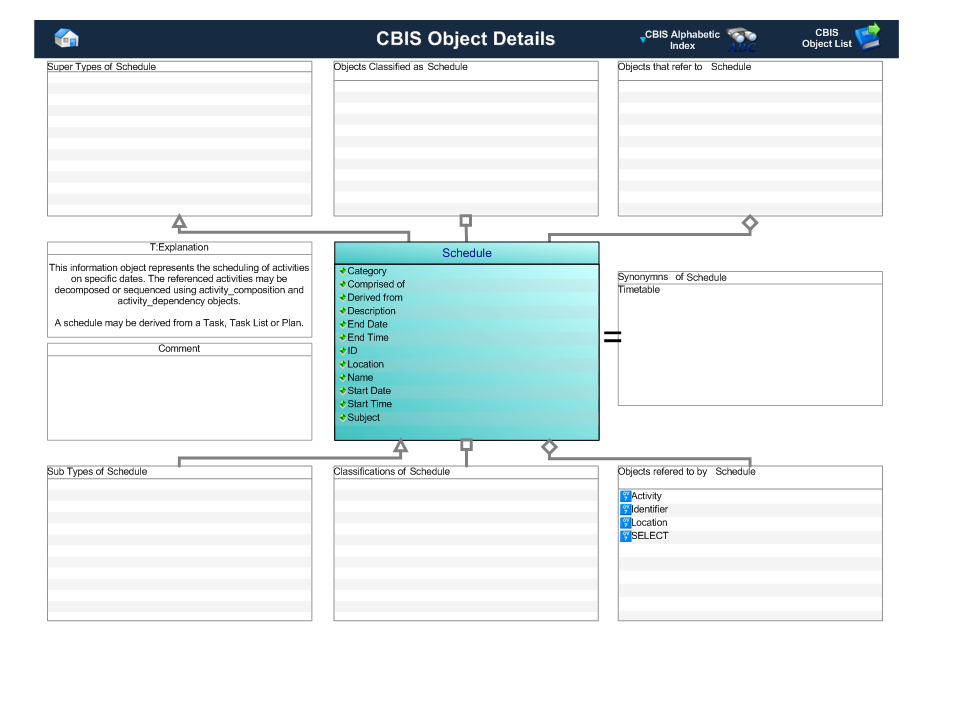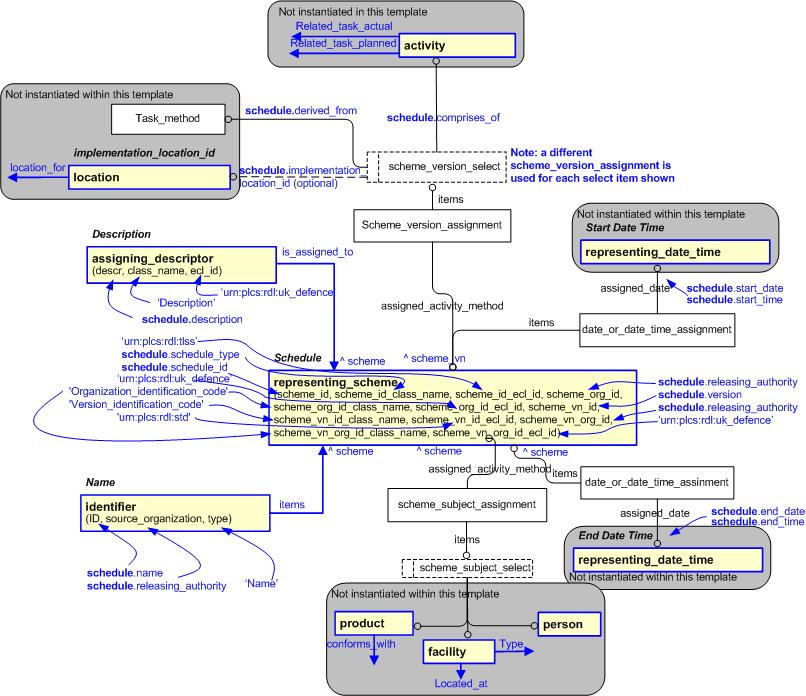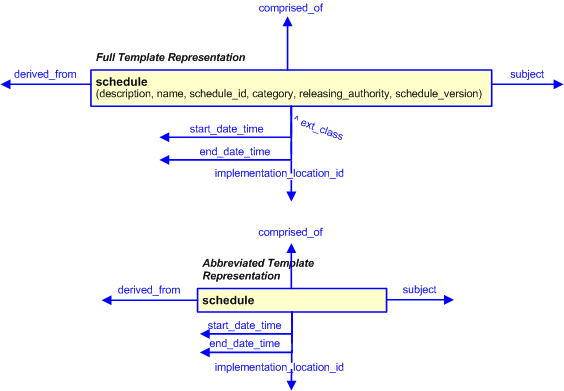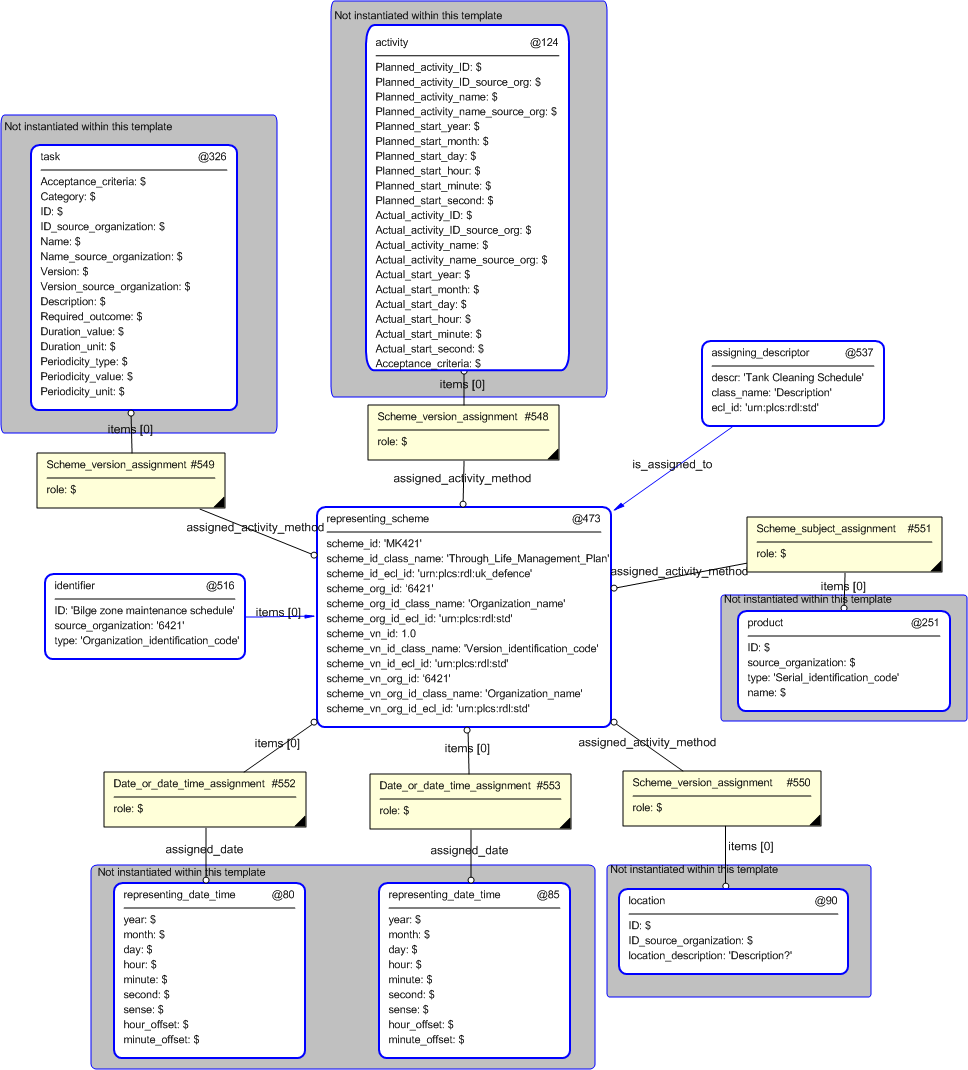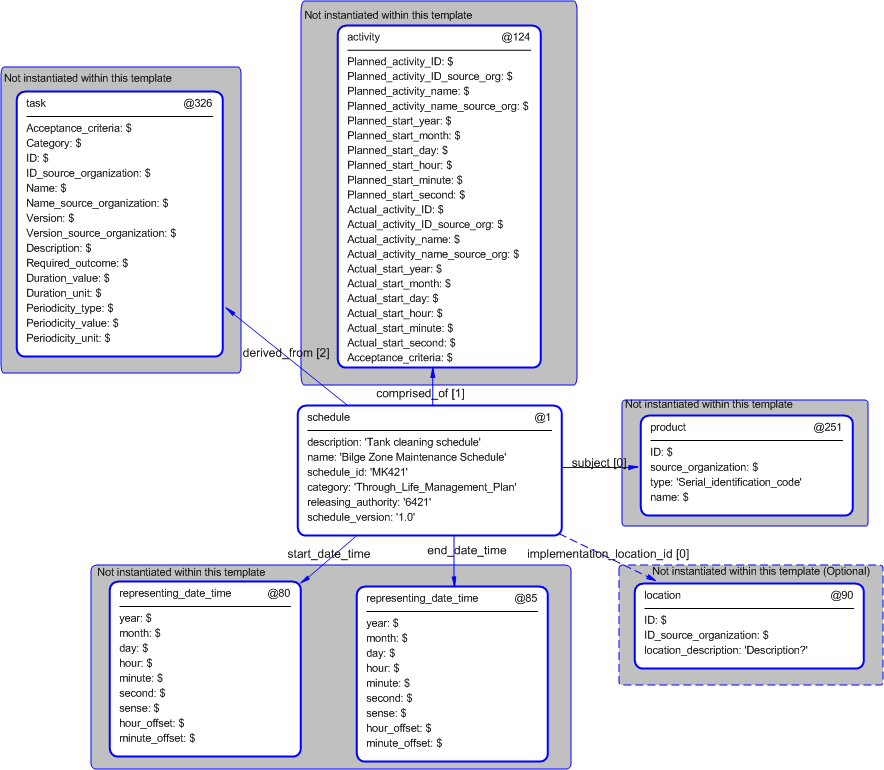Template:— schedule (schdl)
Context:— UK_Defence |
Date: 2009/11/01 22:02:00
Revision: 1.5
|
This section specifies the template schedule.
NOTE
The template has been defined in the context of
UK_Defence.
Refer to the business context for details of related templates.
NOTE
An explanation of a template and the associated instantiation path is
provided in the
Template overview
section.
This template describes how to represent the UK_Defence concept of a schedule in terms of PLCS
model elements (templates, entities, and reference data).
This information object represents the prescribed sequence for the conduct of activities.
The definition of the schecule object is: This information object represents the instantiation of the planned schedule, detailing
specific dates for the performance of tasks on specific products using specific resources.
Figure 1 — Graphical Representation for Business Object schedule
|
Attribute name
|
Attribute description
|
Attribute type
|
Optionality
|
| Category |
This attribute provides the type of schedule. |
Intrinsic |
Mandatory |
| Comprised of |
Relation to Task, Schedule or Task_list |
Intrinsic |
Mandatory |
| Derived from |
This is the item from which the schedule was derived. |
Select, task, task_list, Plan |
Mandatory |
| Description |
This attribute provides the description of the schedule. |
Intrinsic |
Mandatory |
| End Date |
This attribute provides the date for the schedule |
Intrinsic |
Mandatory |
| End Time |
This attribute provides the time for the schedule |
Intrinsic |
Mandatory |
| ID |
This attribute provides the identification of the schedule. |
Identifier |
Mandatory |
| Identifier.id |
This is the value of the id attribute of the Identifier applied to the schedule. |
intrinsic |
Mandatory |
| Identifier.type |
This attribute is the type associated with the id of the Identifier given
to the Schedule. This must be one of the classes provided, it is intended that business users will add types of
schedule as appropriate.
|
Scheme_type |
Mandatory |
| Identifier.source_organization |
This attribute is the value representing the source organization that
provides the id of the Identifier given to the schedule This value is assumed to be a
type of Organization_identification_code.
|
Organization_identification_code |
Mandatory |
| Location |
This is the reference to the location at which the schedule is required to be executed. |
Location |
Optional |
| Name |
This attribute provides the name of the Schedule. |
Intrinsic |
Mandatory |
| Start Date |
This attribute provides the start date for the schedule. |
Intrinsic |
Mandatory |
| Start Time |
This attribute provides the start time for the schedule. |
Intrinsic |
Mandatory |
Table 1 — Schedule attribute details
The EXPRESS-G diagram in
Figure
2
shows the templates and EXPRESS entities that are required
to represent the template
"schedule".
The text highlighted in blue shows the template parameters.
Figure 2 — An EXPRESS-G representation of the Information model for schedule
The graphic for the template to be used in other EXPRESS-G diagrams
is shown in Figure
3
below.
Figure 3 — The graphical representation of the schedule template
The following input parameters are defined for this template:
The identity of the plan with which the schedule is associated.
The relation to the activities with which the schedule is associated.
Reference to the object for which the schedule has been defined (Product, Facility or Person)
The description of the schedule
The name of the schedule.
This is the start date and time of the schedule.
The identifier of the schedule (Scheme_type).
category (Default=Through_Life_Management_Plan,Type='CLASS')
The type of the schedule.
An Organization representing the publishing authority of the schedule. This attribute represents ownership and the authority
to release the schedule, even if the schedule has been prepared by a different organization. Note - It is assumed that the
source organization of the schedule identifier is the same as the releasing authority.
The identifier assigned to the storage location.
This is the end date and time of the schedule.
The version of the schedule.
The following reference parameters are defined for this template:
Allow the
External_class
entity instantiated in this path to be referenced when this template is used.
Note: The
External_class
entity can be referenced in a template path by:
%^target = $schedule.ext_class%
The instantiation path shown below specifies the entities that are to be
instantiated by the template.
A description of templates and the syntax for the instantiation path is
provided in the
Templates Help/Information section.
/
representing_scheme(
scheme_id=@schedule_id,
scheme_id_class_name=@category,
scheme_id_ecl_id='urn:plcs:rdl:uk_defence',
scheme_org_id=@releasing_authority,
scheme_org_id_class_name='Organization_identification_code',
scheme_org_id_ecl_id='urn:plcs:rdl:uk_defence',
scheme_vn_id=@schedule_version,
scheme_vn_id_class_name='Version_identification_code',
scheme_vn_id_ecl_id='urn:plcs:rdl:std',
scheme_vn_org_id=@releasing_authority,
scheme_vn_org_id_class_name='Organization_identification_code',
scheme_vn_org_id_ecl_id='urn:plcs:rdl:uk_defence')/
-- assign ref parameters %^scheme = $representing_scheme.scheme%
%^scheme_vn = $representing_scheme.scheme_vn%
-- subject Scheme_subject_assignmentScheme_subject_assignment.assigned_activity_method ->
^scheme
Scheme_subject_assignment.items ->
@subject-- description /
assigning_descriptor(
descr=@description,
class_name='Description',
ecl_id='urn:plcs:rdl:uk_defence',
is_assigned_to=^scheme)/
-- schema name /
identifier(
ID=@name,
source_organization=@releasing_authority,
type='name',
items=^scheme)/
-- start date Date_or_date_time_assignment.assigned_date ->
@start_date_timeDate_or_date_time_assignment.items ->
^scheme_vn
-- end date Date_or_date_time_assignment.assigned_date ->
@end_date_timeDate_or_date_time_assignment.items ->
^scheme_vn
-- Comprises of Scheme_version_assignmentScheme_version_assignment.assigned_activity_method ->
^scheme_vn
Scheme_version_assignment.items ->
@comprised_of-- Location Scheme_version_assignmentScheme_version_assignment.assigned_activity_method ->
^scheme_vn
Scheme_version_assignment.items ->
@implementation_location_id-- Derived_from Scheme_version_assignmentScheme_version_assignment.assigned_activity_method ->
^scheme_vn
Scheme_version_assignment.items ->
@derived_from
The instance diagram in Figure
4
shows an example of the EXPRESS entities and templates that are instantiated by the template:
/schedule(derived_from='@326', comprised_of='@124', subject='@251', description='Tank Cleaning', name='Bilge zone maintenance schedule', start_date_time='@80', schedule_id='MK421', category='Through_Life_Management_Plan', releasing_authority='6421', implementation_location_id='@90', end_date_time='@85', schedule_version='1.0')/
(an illustration of the consolidated schedule template is shown in
Figure
5 below.)
Figure 4 — Entities instantiated by schedule template
The instance diagram in
Figure
5
shows the graphic symbol for the template that is to be
used in other instance diagrams. The example template is:
/schedule(derived_from='@326', comprised_of='@124', subject='@251', description='Tank Cleaning', name='Bilge zone maintenance schedule', start_date_time='@80', schedule_id='MK421', category='Through_Life_Management_Plan', releasing_authority='6421', implementation_location_id='@90', end_date_time='@85', schedule_version='1.0')/
Figure 5 — Instantiation of schedule template
Characterizations
No common characterizations of the template
schedule
have been identified. However, the ISO 10303-239 EXPRESS model
may enable other assignments to the entities instantiated by the template.
